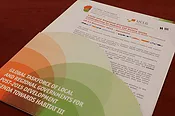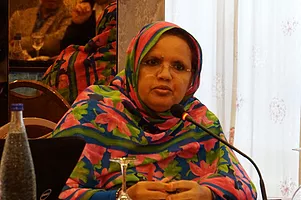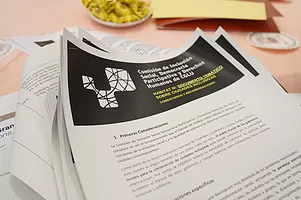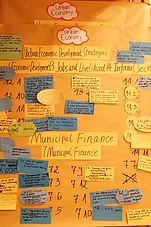
On 10 November, representatives of fourteen local government networks of the Global Taskforce and their partners began an intensive three days of meetings in Barcelona, in the framework of the newly adopted 2030 Agenda and the run up to Habitat III in October 2016.
A packed calendar for the Global Taskforce
The morning of the first day focused on discussions on the implementation and localization of the 2030Agenda. It was recalled that 65% of SDG targets require local action for their implementation. Participants underlined the importance of ongoing advocacy by local and regional governments at national level, particularly with regards to national SDG monitoring programmes.
They also highlighted that localization goes beyond the technical aspects and that it should be seen as a political matter. Beyond the specific indicators needed at local level, the discussion on the SDGs needs to be oriented towards appropriate competences for local governments so that they can play their full role in the achievement of the 2030 Agenda. Furthermore, it was agreed that it is important to promote the work that many local governments are already doing to contribute to the achievement of the SDGs. The Global Taskforce must address the political aspects of localization going forward.

Mayor of Tevragh-Zeina and President of REFELA (the Local Elected Women Network of Africa), Fatimetou Mint Abdel Malik, expressed the consensus among networks of the need to link SDG11 on sustainable cities and human settlements with the New Urban Agenda at Habitat III.
Global Taskforce networks also shared their preparations for the COP21 climate conference in Paris, starting on 30 November. At both the formal sessions of COP21 and the Climate Summit for Local Leaders, local governments in Paris will make efforts to highlight the social impact of climate change at local level.
The UCLG Gender, Culture and Social Inclusion committees will organize sessions in Paris to draw out links between the climate agenda, gender equality, social inclusion and the New Urban Agenda. This will allow local and regional governments to look at climate and sustainability issues from a broader perspective alongside civil society. Participants agreed that the GTF and local government networks will have to mobilize to help cities implement COP21 and access financing after the conference.
In the afternoon, networks discussed preparations for PrepCom 3 in Surabaya, the organization of the Second World Assembly of Local and Regional Governments, local government representation at the Global Assembly of Partners and expectations from the Habitat III Conference in Quito.
The Global Taskforce also confirmed its commitment to continue supporting the work of the Global Assembly of Partners in the Habitat III process and to ensure links between the process of the local government constituency and other stakeholders. The Global Assembly of Partners was praised as a serious effort to include all relevant actors in the discussion of the New Urban Agenda.
Habitat III Policy Unit debates

On days 2 and 3, the Global Taskforce was joined by experts from 8 of the 10 Habitat III Policy Units, currently embarking on their work on policy recommendations in their areas of specialty for the New Urban Agenda. Policy Unit 4 on Urban Governance, Capacity and Institutional Development is being led by the London School of Economics and UCLG, in close coordination with the Global Taskforce of Local and Regional Governments.
The meeting aimed to provide an informal space for exchange to ensure a more crosscutting approach to the policy discussions of the Policy Units. The session was also intended to share the narrative of local and regional governments with those Policy Unit experts with links to the local government community.
Participants split into three groups to debate the ‘key drivers for action’ in the Habitat issue papers with a view to the work of the Policy Units.
Group 1 debated Policy Unit 1 on Right to the City and Cities for All, Policy Unit 2 on Socio-cultural Urban Frameworks, Policy Unit 9 on Urban Services and Technology, and Policy Unit 10 on Housing Policies.

The group called for the Right to the City to be put at the heart of the New Urban Agenda as a new generation of human rights. This right should be clearly defined and measurable by concrete indicators and guaranteed by legal mechanisms. The group questioned economic growth and technological development as ends in themselves, calling for human-centred, inclusive economies and for technology to be put at the service of citizen participation. Participants also raised the issue of spatial exclusion and segregation and called for polycentric, mobile and well-connected cities to ensure social inclusion.
Group 2 debated Policy Unit 4 on National Urban Policies and Urban Governance and Policy Unit 5 on Capacity and Institutional Development.

The group called for a greater recognition of the unique characteristics and added value of local governments in development, that is: their proximity to citizens; their link to a particular geographical area; their flexibility and responsiveness, and their ability to foster citizen participation. Given these characteristics, the group agreed that a greater focus on decentralization and local autonomy in Policy Units 4 and 5 is needed, as well as a more ‘bottom-up’ vision of governance throughout.
Group 3 debated Policy Unit 5 on Municipal Finance, Policy Unit 6 on Urban Spatial Strategies, Policy Unit 7 on Urban Economic Development Strategies, and Policy Unit 8 on Urban Ecology and Resilience.

The group emphasized the importance of guaranteeing that local governments have the adequate financial and technical means to ensure the sustainable development of their territory. The group called for local control over spatial development and the sufficient provision of public spaces, accessible for use by the informal sector. Participants also advocated for improved capacities to monitor local economic development at the most appropriate scale and for the promotion of alternative ways of working and living through urban-rural linkages and resilient urban ecosystems.
Next steps
Participants agreed that the meetings provided a unique and valuable opportunity to come together and discuss the New Urban Agenda across Policy Units, and to start to construct a holistic vision towards Habitat III. They requested that UCLG and the Global Taskforce follow-up on the recommendations and debates from the meetings and continue to facilitate ongoing exchange and a local government vision on the agenda to participants over the coming months. The Global Taskforce plans to organize another such meeting early in the New Year to build on the recommendations and discuss Habitat III advocacy strategies on the basis of the Policy Unit outcomes.
Local government recommendations relating to each Habitat III Issue Paper
Policy Unit 1 - Right to the city and city for all
Policy Unit 2 - Socio-cultural urban frameworks
Policy Units 3/4 - National urban policies/Urban governance, capacity and institutional development
Policy Unit 5 - Municipal finance and local fiscal systems
Policy Unit 6 - Urban spatial strategies: land market and segregation
Policy Unit 7 - Urban economic development strategies
Policy Unit 9 - Urban services and technology
(The briefings on Policy Unit 8 and 10 will be ready shortly)
You can see an overview of how participants shared the #GTFMeets debates on Twitter in this Global Taskforce Storify.
